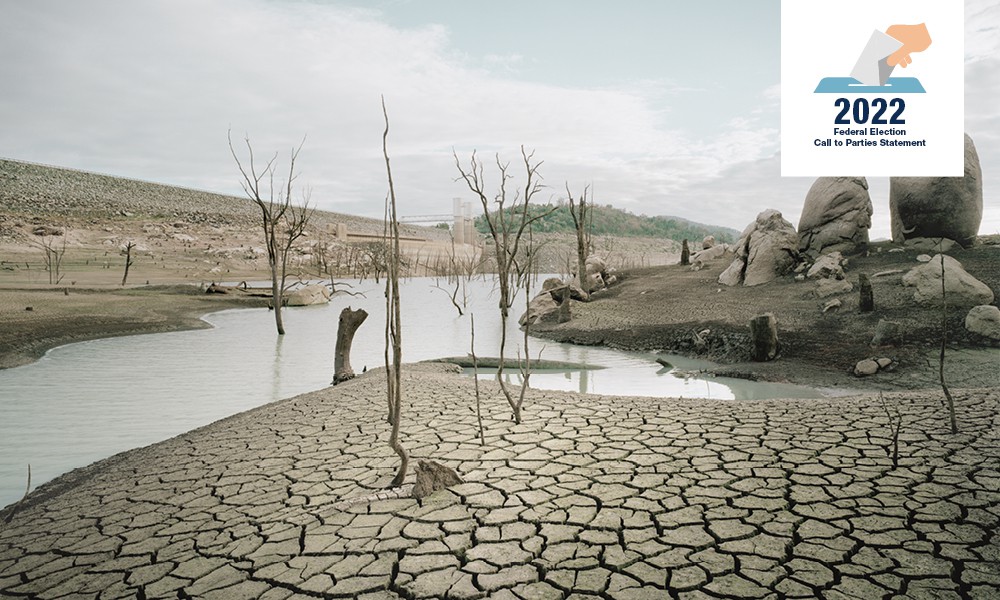Queensland Law Society has released the federal election 2022 Call to Parties Statement in anticipation of the upcoming federal election.
The Call to Parties outlines key areas of concern for Queensland’s legal profession, and calls on political parties to commit to specific actions to address these concerns.
Recent environmental, scientific and political developments have brought the Australian Government’s handling of climate change and natural disasters into sharp focus.
Last month, the Intergovernmental Panel on Climate Change (IPCC) released the third instalment of the IPCC’s Sixth Assessment Report (AR6), which followed the second instalment released in late February.1 The AR6 relevantly provides further evidence that human-induced climate change and global warming is increasing the frequency and intensity of extreme weather events, including hot extremes and heavy precipitation events.2
At the time the IPCC released the second instalment of the AR6, Australia was experiencing catastrophic and record-breaking floods, which saw thousands of people evacuated from flood-affected areas.3 The impacts of the floods are expected to cost Queensland $2.5 billion in restoration.4
The AR6 makes it clear: without a strengthening of policies, greenhouse gas emissions are projected to rise, leading to a median global warming of 3.2°C by 2100.5 As such, the economic and physical impacts of climate change, including more frequent and intense extreme weather events, are expected to increase as a consequence of human-induced climate change and global warming, unless immediate and substantial adaptation and mitigation strategies are implemented to minimise these effects.6
It was in this context, set against the backdrop of the floods and the release of the AR6, that the Australian Government released its federal Budget. According to the Climate Council, the Budget has dedicated about 0.3% of its total expenditure on climate change initiatives for 2021-2024.7 While additional funding has been allocated for disaster management and relief, further funding is needed to address the underlying causes of extreme weather events.
Given these recent environmental, scientific and political developments, QLS is calling on the Australian Government to take meaningful action on climate change and disaster management. In particular, QLS has called for the Australian Government to commit to establishing an effective, evidence-based legislative framework to mitigate and adapt to climate change that:
(a) is informed by the independent advice of a commission or authority, drawing on the latest science-based evidence and research to ensure that the legislative framework:
(i) is clear, consistent and in accordance with the principles of good law
(ii) sets out the intended policy objectives with clear processes and mechanisms to achieve those objectives
(b) includes clear and ambitious pathways, sector-based short-term and medium-term targets and regular transparent reporting to achieve Australia’s policy outcomes and contribute to Australia’s international undertakings in response to climate change to limit global warming to 1.5 degrees above pre-industrial levels
(c) makes additional funding available to the legal assistance sector, to both meet immediate demand for services as well as to assist in the development of disaster response resources, recognising the ongoing increased legal need of climate-impacted vulnerable and disadvantaged communities
(d) involves meaningful consultation with Aboriginal and Torres Strait Islander peoples about the impacts of climate change on land that they, as original custodians, have cared for and managed for over 60,000 years
(e) assists other nations, particularly in the Asia-Pacific, to create safer climate economies and adapt to the climate crisis
(f) provides a certain, timely and equitable pathway for the transition of those relying on carbon intensive industries to sustainable alternatives.
More information on the Call to Parties document can be found on the QLS website.
Footnotes
1 IPCC, Climate Change 2021: The Physical Science Basis (August 2021); IPCC, Climate Change 2022: Impacts, Adaptation and Vulnerability (February 2022); IPCC, Climate Change 2022: Mitigation of Climate Change (April 2022).
2 IPCC, Climate Change 2021: The Physical Science Basis (August 2021) SPM-10, SPM-19.
3 ABC, Australia’s record-breaking floods can be traced back to one thing, experts say (4 March 2022).
4 ABC, South-east Queensland flood damage bill revised to cost up to $2.5b but return to surplus remains on track, Treasurer says (March 2022).
5 IPCC, Climate Change 2022: Mitigation of Climate Change (April 2022) SPM-21.
6 IPCC, Climate Change 2022: Impacts, Adaptation and Vulnerability (February 2022) SPM-7 – SPM-11; Climate Council, Markets are Moving: The Economic Costs of Australia’s Climate Inaction (October 2021) p. II.
7 Climate Council, “A massive lost opportunity”: Virtually no funding for climate in federal budget (March 2022).














2 Responses
I question why QLS is getting involved in climate change advocacy when it is a professional association for lawyers. QLS’s mandate is only to advocate in relation to law, justice, the legal system and Qld lawyers. There are many factors to consider in relation to climate change response, including economic impact and energy reliability, about which QLS has no expertise. Further, there is a real question about what impact a reduction in emissions by Australia will have on global climate (and natural disasters in Australia) considering our small contribution global emissions, and the increasing emissions of other much larger emitters. With all that in mind, I doubt there is consensus among QLS members regarding the type and extent of measures that should be implemented, and even if there was consensus, this has nothing to do with QLS’s mission. QLS is not an environmental activist group.
“QLS is not an environmental activist group.”
Yes, it is. It shouldn’t be, but it is.